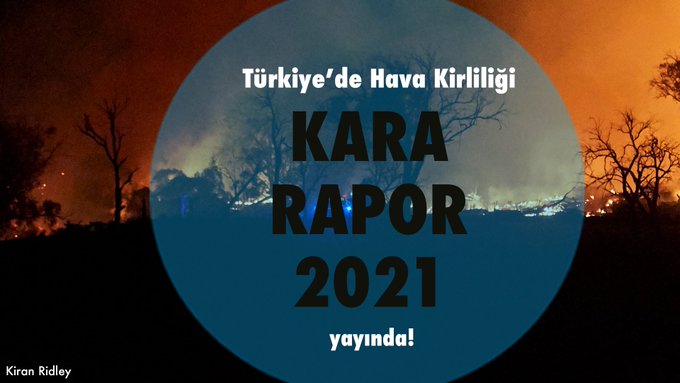Dark Report 2021: ‘Only 2 Cities in Turkey Have Clean Air’

‘Dark Report 2021: Air Pollution and Health Effects’ research of the Right to Clean Air Platform (THHP) has been published. According to the report, only two cities in Turkey have clean air. Air pollution in 45 provinces exceeds national limit values. Polluted air facilitates the entry of the COVID-19 virus into the body. THHP proposes to develop an 'Air Pollution Fighting Strategy' and to create Clean Air Action Plans on a provincial basis.
In ‘Dark Report 2021: Air Pollution and Health Effects’ report prepared by THHP and published for the fourth time this year; it is revealed that there are serious air pollution problems that have not been resolved for years in some provinces of Turkey.
The report, which examines the air quality of the last 5 years, draws attention to the increase in the number of stations measured in 2020. However, since the death data for 2020 were not announced by TÜİK (Turkish Statistical Institute); It is emphasized that the number of deaths due to air pollution, which has been calculated every year since 2017, cannot be determined this year.
The highlights of the report are:
Half of the Turkey are not Aware of the Air They Breathe
- In 2020, the level of fine particles (PM2.5), which is carcinogenic, was not adequately measured in half of the provinces in Turkey, namely 42 cities.
- In 2020, clean air was breathed below the guidelines recommended by the World Health Organization (WHO) in only 2 provinces (Bitlis and Hakkari) in Turkey.
- When the particulate material values (PM10) of 72 provinces from which sufficient data can be obtained in 2020, even the national limit values of air pollution were exceeded in 45 provinces. In the report, it was stated that due to forest fires, black carbon pollutant is released into the air, which also causes climate change.
- Polluted air facilitates the entry of the COVID-19 virus into the body; Air pollution also affects genes, triggering major depression and aging in adults.
The Air in 12 Cities is Polluted All Year
- Air pollution is an all-yearlong problem in 12 cities of Turkey: in 15 stations in Muş, Iğdır, Istanbul, Sinop, Malatya, Edirne, Tokat, Kayseri, Denizli, Düzce, Karabük, Ağrı and Ankara in the measurements made during 2020 ‘high air pollution’ was observed.
- In Turkey, only in Bitlis and Hakkari, air pollution (PM10) was measured below the WHO guideline values. The city with the highest air pollution is Muş; The people of Muş breathed polluted air 306 days in a year.
The Air of the Districts of the 3 Metropolitans is Dirty
- In 2020, the average of PM10 in Istanbul was lower than in previous years, but even this level was twice the WHO’s recommended guideline values.
- In the districts of İstanbul, Mecidiyeköy, Sultangazi, Esenyurt and Alibeyköy, the PM10 average was more than thrice the WHO annual guideline values.
- Near Ankara Siteler station, the annual PM10 average exceeded four times the WHO guideline values.
- The worst air quality in İzmir was measured in Aliağa, in which measurement data have not been shared with the public since 2016.
Forest Fires Also Polluted the Air
- The increase in heat-waves and forest fires in the last 10 years in Turkey are among the major causes of air pollution. Air pollution from forest fires and particulate matter in smoke, ground-level ozone and carbon monoxide exposure are the biggest health risks.
- Due to the fire in Hatay – Samandağ in 2020, black carbon pollutant was released into the air, which also causes climate change. Black carbon is one of the air pollutants that cause climate change.
Polluted Air Facilitates the Entry of COVID-19 into the Body
- Millions of people exposed to long-term air pollution struggle with respiratory and cardiovascular diseases, chronic diseases such as diabetes or cancer, and become more vulnerable to viruses such as COVID-19.
- Higher numbers of COVID-19 cases in areas with higher air pollution. Therefore, it is recommended to take measures to reduce air pollution to combat the COVID-19 disease pandemic.
- Air pollution is also effective on genes. While it is stated that the effect of pollution is different in all periods of life, the susceptibility to the effects of particulate matter increases in pre-pregnancy, in the womb, early childhood and old age periods.
- ‘In recent years, the findings on the relationship between PM exposure and mental health have started to become clearer. There is evidence for the possible role of air pollution in triggering mental disorders, in particular major depression.’
Call for a Strategy for Clean Air and Fighting Against Air Pollution
Based on all these findings, the recommendations of the Right to Clean Air Platform, which published Dark Report 2021, are as follows:
- ‘Strategy for Fighting Against Air Pollution’ should be developed
- Clean Air Action Plans should be created based on cities
- All pollutants, especially PM2.5 and PM10 values, should be regularly monitored and disclosed throughout the country.
- Data such as the number of deaths that will allow calculating the health effects of air pollution should be disclosed.
- Coal-fired power plants that do not complete the necessary investments to comply with environmental legislation should not be allowed to operate.
- Health Impact Assessment Report should be requested from industrial investments
- Air Pollution Legislation must be aligned with WHO guideline values
- Fossil fuel subsidies should end and just transition plans should be made
- Alternative energy sources and means of transportation should be supported.
- The Ministry of Health and the Ministry of Environment and Urbanization, NGOs and professional organizations should cooperate, and plans should be made to reduce air pollution in the post-pandemic period.

Bizi Takip Edin